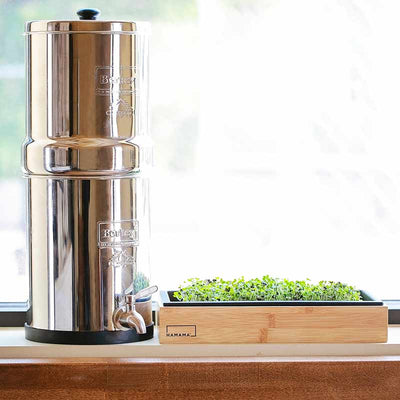
Green thumb? Or at least trying to incorporate more plants into your life?
Use Berkey water for great results. If you have water remaining in the bottom chamber of your Berkey (totally normal by-the-way), instead of pouring it down the drain, quench your plants' thirst. Harsh chemicals that can be found in tap water are especially detrimental to seedlings. Berkey addresses substances such as chlorine and glyphosate. Why pour a chemical that inhibits the growth of plants when you're trying to get it started?
Quench Spring fever by welcoming new life into your life. An easy way to do that is starting a garden inside! Grow fresh food indoors every season, or just get a head start on your plants to transplant outside when the time is right. Reap the rewards of what you sow--revel in the joy of seeing seedlings pop through the soil for the first time, stretching towards the sun, and harvesting the fruits of your labor.
Another great benefit of starting seeds is the economical aspects. Growing your own food is oftentimes costs less than groceries. Seeds are typically cheaper than buying plants, and you get more for the cost. Starting seedlings only needs a container, soil, light, and water--bonus points for high quality water.
How to Begin:
Research your planting zone and make seed selections based on your environment. Look for plants that are best suited for your climate. There may be some variability if you're planing on indoor gardening, which allows you to control more variables, therefore creating a more customized climate.
If you're just starting out, pick 3-4 types of seeds. Keep it simple with just a few varieties that you can devout your time and energy. Another helpful hint is to select plants that are hardy, in other words, they can survive just about anything giving you more forgiveness while learning.
Some great starter plants suggestions include:
▪️ Tomatoes 🍅
▪️ Basil 🌱
▪️ Sunflowers 🌻
▪️ Marigolds 🌼
Tomatoes are hardy, easy to grow, and very productive.Tomatoes are very rewarding because one plant can produce several tomatoes. Homegrown tomatoes put grocery store tomatoes to shame. They're far more fragrant and significantly fresher. Water free from chemicals and contaminants will make your tomatoes healthier and more prolific.
Basil is an easy herb to grow in a windowsill or similar location. It's grows quickly and the leaves can continuously be plucked and will grow back for fresh flavor all season. Basil is an everyday use herb commonly used in many recipes. Its also great to add to water!
Why use Berkey water?
Water is key to life, including plant life. When little baby plants are just starting out they're more likely to survive and thrive when the water is filtered. Seedlings absorb water which is how they also get their nutrients. You don't want your fragile seedlings absorbing contaminants like pharmaceutical residue or heavy metals.
Step by Step Guide:
1. Start with seeds! Buy a packet of seeds--hardware stores, garden stores, sometimes grocery stores or drug stores will carry seed packets during certain months out of the year. Several can be purchased for less than five bucks!
2. Find a container. You need something for your seeds to grow in. Get creative--cardboard milk cartons, non-styrofoam egg cartons, even toilet paper rolls work great! These items are good because they make transplanting easy because the material is biodegradable. Commercial kits are also a great option because they're specifically designed just for this. We love peat pots and have the best success with them.
3. Let's talk dirt! Or rather, soil, because dirt is a lesser term. The soil used for seedlings should be sterile (free from diseases) and well-draining. Most garden supply stores sell soil that's specially made for seedlings. Do not reuse soil from houseplants or your yard.
4. Hydrate! Keep the soil moist for your little baby plants. Take care not to over water. Consult the directions on the seed packet for seed depth in the soil and how much water that variety of plants prefers. Use a small spray bottle filled with Berkey water to moisten the soil.
5. Let there be light! ...and warmth! Place your container where it can get plenty of natural sunlight, ideally in a south-facing window. Light in necessary for the photosynthesis process but it also provides warmth, which plants need. One way to create a greenhouse-like effect is covering the container in plastic wrap. Use toothpicks or chopsticks to hold up the wrap.
6. Watch them grow! Periodically check the soil moisture. It's best to let it dry out slightly between waterings. Time is your best friend. It takes a few dates for seeds to sprout.
7. Prepare for transplant. Let your seedling grow to the points that they have 2-3 leaves on their stem. Once they get to that point start "hardening" them to make it a smooth transition to outdoors. See below for How to Harden Sprouts.
How To Harden Your Sprouts
This is the process of gradually acclimating seedlings to survive outdoors. If you're going to keep your seedlings indoors, there's no need to do this. If you're eventually transplanting your sprouts outside, you'll need to follow these steps.
- 7-10 days before movings plants outside permanently, place the sprouts outside in a semi-shady location for a few hours a day. Make sure that spot is protected from the wind and monitor for sun-damage.
- Each day extend the amount of time that the plants spend outdoor.
- Don't forget to continue to water the sprouts with Berkey water. Moist, not wet. You may need to adjust how much water you're giving them due to outdoor climate.
- Once the plants are to a point where they're outside for most of the day and the temperature is warm enough overnight, make the move. Transplant your sprouts into soil in location with proper sunlight exposure, wind protection and good soil composition.
For big results, continue to water plants with Berkey water and enjoy!












